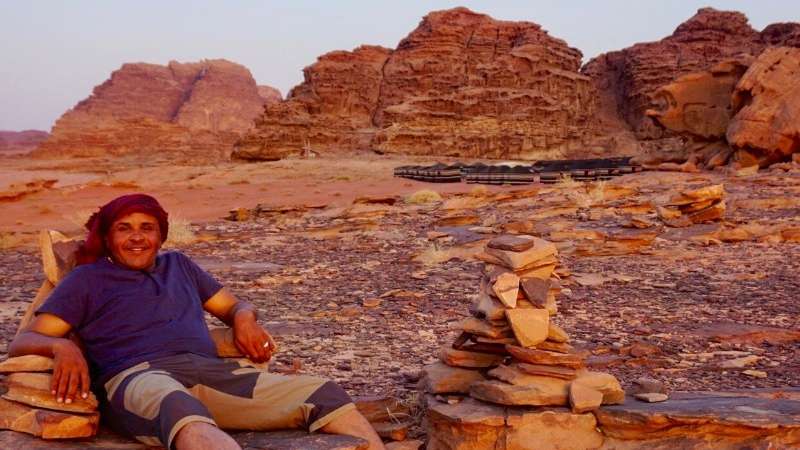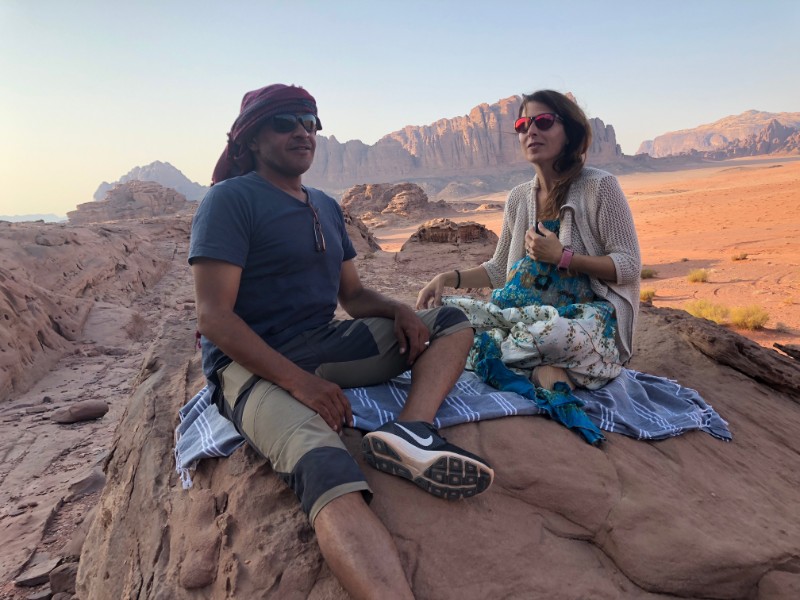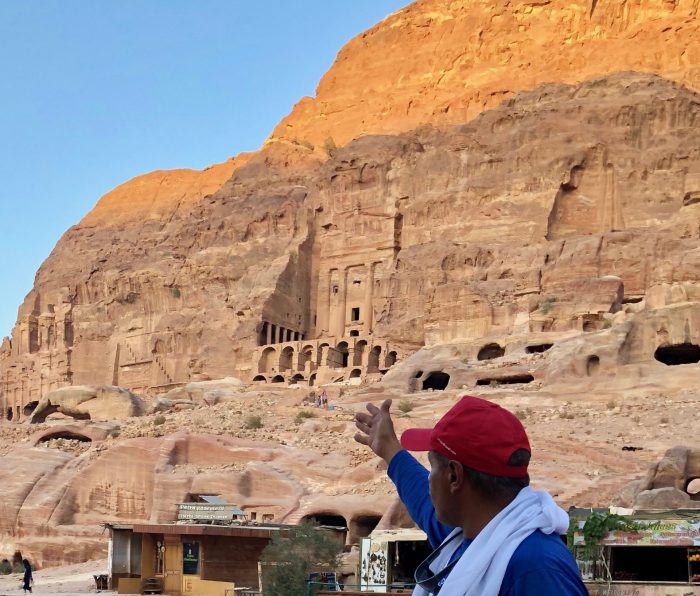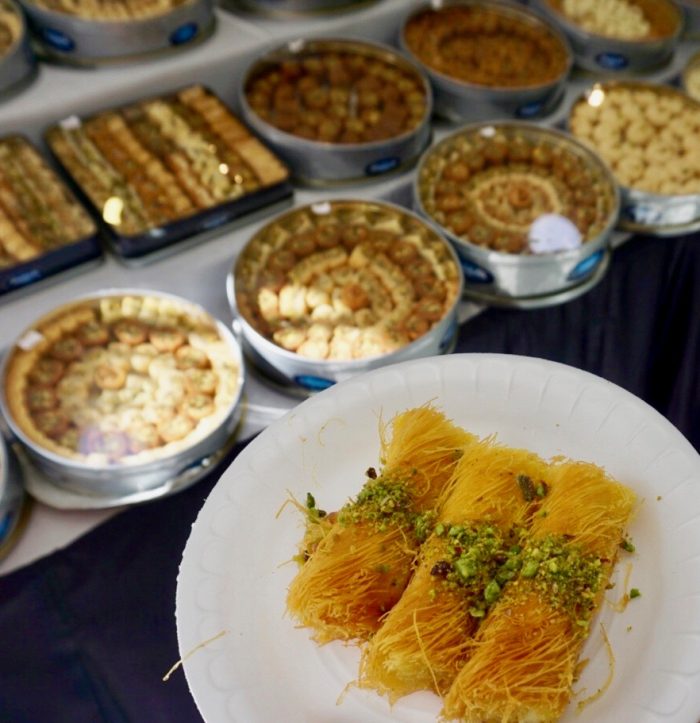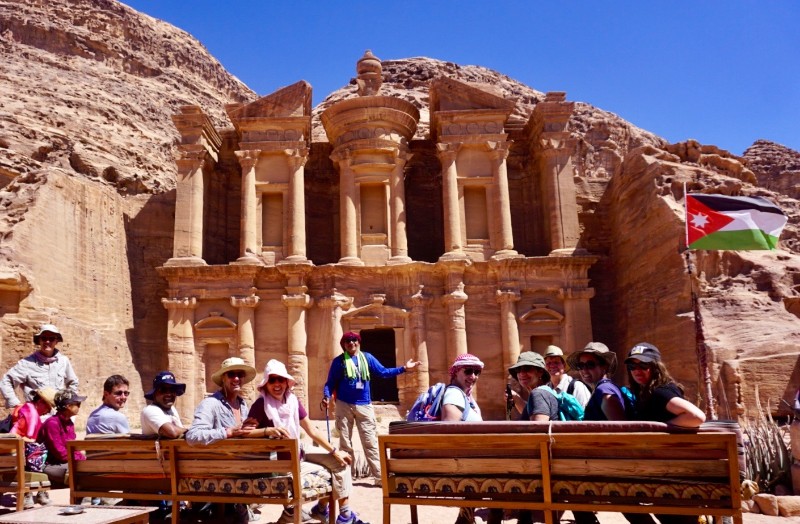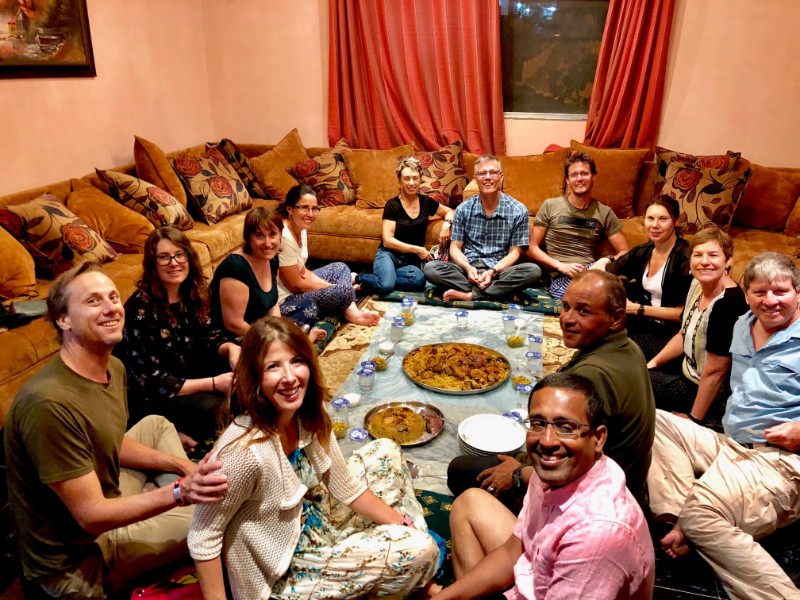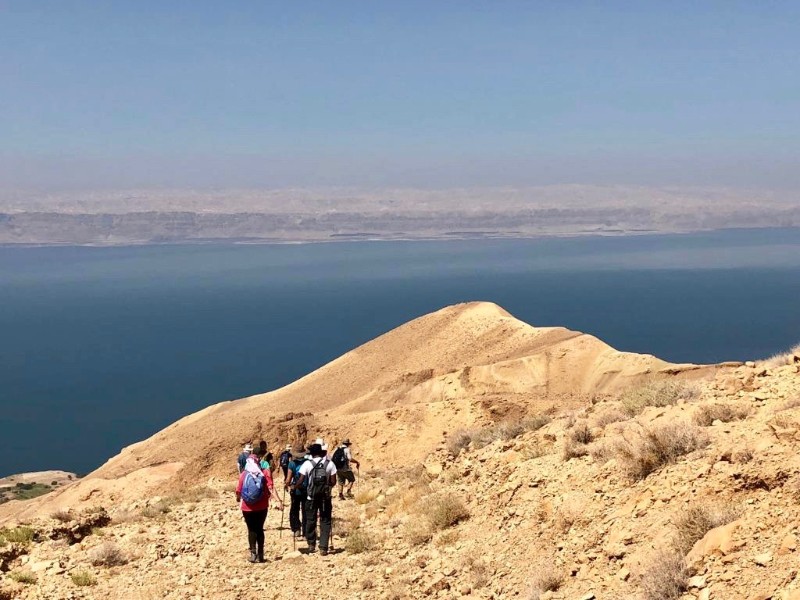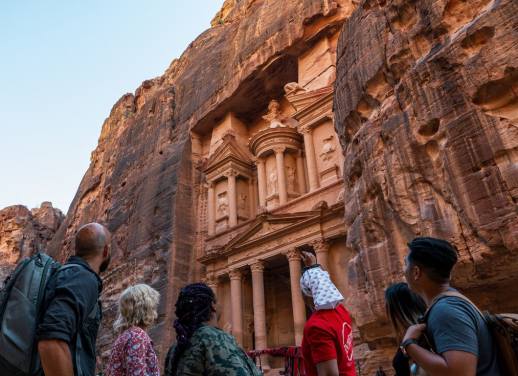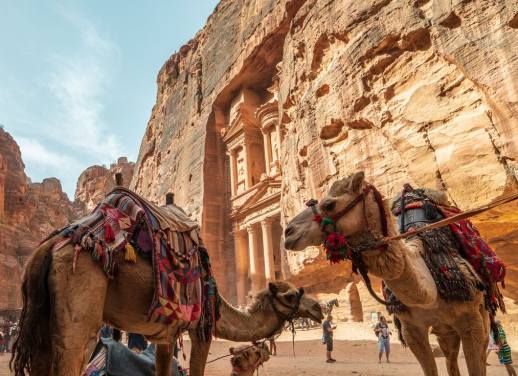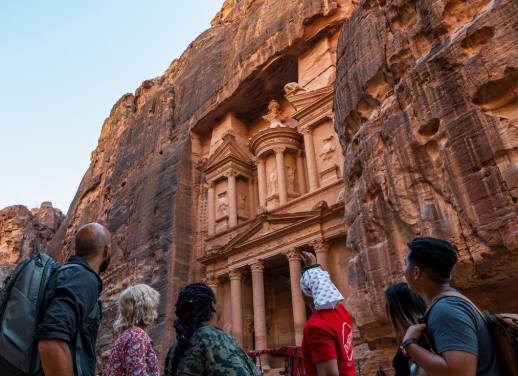Traveling around Jordan with Intrepid leader Usama Awad feels like hanging with a local celebrity. Granted, he performed with a band in college – and we were fortunate to hear him sing on more than one occasion – but familiarity with people and places is what illuminates his rock star status.
Usama knows everyone, and loves to share their colorful backstories. And everyone knows Usama.
Maybe this is to be expected with any long-time professional guide. But, when you’re trekking along a remote plateau where you haven’t seen another human for hours and suddenly your fearless leader points to a shepherd in the distance minding his flock and says, “Oh, there’s so-and-so, let’s go meet him,” and proceeds to tell you all about the man, his tribe AND his flock, well, that’s a guide-in-the-know.
From history to hip hop and geology to religion, Usama offered our trekking group an education in all things Jordan over the course of this 8-day trip. “Am I boring you?” he would stop his characteristically rapid-fire explanations to ask. Every time, our group yelled “no” in unison. His passion, for sharing his culture in a relatable manner, was evident in every animated story.
Modestly, he credits Jordan’s tourism curriculum, along with Intrepid Travel’s training program, for his success. “Through the Ministry of Tourism and Antiquities, you must learn all aspects of Jordan,” says Usama. “You must know about history, archeology, politics, economics, religion, ecology. And, of course, you must study how to interact effectively with visitors.” He laughs about role-playing exercises during a course for managing difficult situations. I ask how often those teachings come in handy and he smiles. “It’s all part of being a guide,” he says.
FIND OUT MORE ABOUT INTREPID’S LOCAL LEADERS
As he talked about his education, I couldn’t help but think that many qualities which make him such a stellar guide, are ones that can’t be taught. Take his insatiable curiosity. If you ask him a question about Jordan that he can’t answer, he won’t rest until he uncovers the information. And, perhaps, most strikingly, is his openness and flexibility with different personalities and situations. He shrugs off that compliment and says most Jordanians are open. “It’s who we are as a people,” he explains.
One afternoon while perched on a massive rock formation, waiting on Wadi Rum’s spectacular sunset, I ask what he wishes visitors understood about Jordan. In classic Usama style, he darts from food to religion to landscape. Suddenly, he stops and says, “Basically it comes down to this, the most important thing for any traveler to our country is to come with an open mind. I hope people come to our country to gain an experience,” he adds. “I guarantee they won’t be disappointed.”
Here are 4 things Usama wishes YOU knew about Jordan:
Jordanian hospitality is woven into the culture
Before arriving, I read tales of unparalleled hospitality, inspired by traditional Bedouin culture. Within minutes of landing in Amman, my husband Matt and I came face-to-face with that legendary trait in the form of a taxi driver who invited us to his home for dinner. We declined, saying we were exhausted from the journey, but thanked him profusely.
To our surprise, when we arrived to our hotel, the driver parked and accompanied us inside to make sure our reservation was in order. He asked nothing extra in return, but suggested we keep in touch. Over the following days, he became our virtual guide (via WhatsApp) to local food, sending photos of must-taste dishes and addresses for recommended restaurants.
When we told Usama about this exchange, he scolded us and said, “You should have gone to dinner.” And, we knew he was right. This soul-filling interaction was only one example of over-the-top kindness we experienced. Walking in villages around the country, we were greeted, openly and often, with smiles and the phrase, “ahlan wa sahlan,” meaning welcome. Usama says Jordanians believe it is shameful not to treat guests to the country like you would treat a guest in your own home (let that concept sink in for a minute). During our travels, that belief lit up nearly every interaction.
SUBSCRIBE TO INTREPID’S NEWSLETTER FOR TRAVEL DEALS, GIVEAWAYS, TIPS & STORIES
Jordan is a symbol of peaceful coexistence
“In Jordan, we are all neighbors and friends,” says Usama. One of his favorite topics is the intersection of Christianity, Judaism and Islam. Interfaith dialogue is a significant part of guide training in Jordan. He says guides should explain history from the perspective of the Old and New Testaments and the Koran. “I’m trying as much as I can to connect historical sights and stories and show the overlap where it exists,” he explains. For our group, these discussions were endlessly enlightening.
He also says it’s important to understand that Jordan has long been a haven for refugees. Refugees from Palestine, Iraq and Syria now figure significantly into the country’s population. While the mix isn’t without economic and social issues, the innate inclination to welcome strangers and neighbors while living in harmony is clear to all who visit.
Jordanian cuisine is full of tasty surprises
While falafel and hummus can be found for breakfast, lunch and dinner, there’s much more to the culinary scene. Have you heard of the aptly-named fuul? It’s a soupy fave bean dish with loads of olive oil, chili and lemon juice and it alone is worth the flight.
READ MORE: 7 FOODS YOU SHOULD TRY IN JORDAN
According to Usama, Jordan’s cuisine is unique for mingling Middle Eastern and Mediterranean flavors and traditions. There’s mansaf, a rice and lamb feast, topped with a sour goat yogurt, which is considered the national dish of Jordan. And, ooh, moutabel, a craving-worthy roasted eggplant dip; tabbouleh salads heavy in parsley and garlic, manakish, commonly called Arabic pizza, this list could go on and on.
For one of the most unusual and delicious combinations, Usama suggests Amman’s famous pastry shop, Habibah Sweets, for kanafeh. Soft and crunchy, sweet and salty. Pistachios sprinkled over cheese, baked in dough, then covered in sticky syrup, this pastry is one sweet surprise.
Jordan boosts a richly diverse landscape
Weird fact: Jordan is slightly smaller than the state of Indiana. Which makes it all the more amazing that this small country in the center of the Middle East contains such diverse terrain.
“I thought Jordan was all desert, they tell me” Usama says. “I hear this from visitors all the time. They are astounded once they travel around the country.” He proudly calls the Trek Jordan itinerary his baby. “I helped design the route based on my experience trekking these places and to show off the diversity,” he says.
READ MORE: WHY TO CONSIDER A TREKKING TRIP IN JORDAN (AND WHAT IT’S LIKE)
Naturally, a visit to Petra, one of the 7 New Wonders of the World, is a centerpiece of the itinerary, but Trek Jordan takes a distinctive path. The route includes hiking 20 kilometers along the back trail from lesser-known Little Petra to the UNESCO site’s famous Monastery. Along this trail, we saw more goats than fellow trekkers.
Likewise, descending from the lunar-like cliffs above the Dead Sea to palm-fringed beaches and through the vast ochre sands of Wadi Rum – both routes crafted by Usama and exclusive to Intrepid Travel – introduced us to off-the-beaten-path and wildly-different places.
“You know, you must see Jordan for yourself,” says Usama. “It surprises almost every visitor who comes.”
Ready to experience the wonders of Jordan with a local leader? Check out Intrepid’s small group trips in Jordan.
—
(All images taken on Intrepid’s Trek Jordan trip, and all courtesy of Jess, the writer.)

